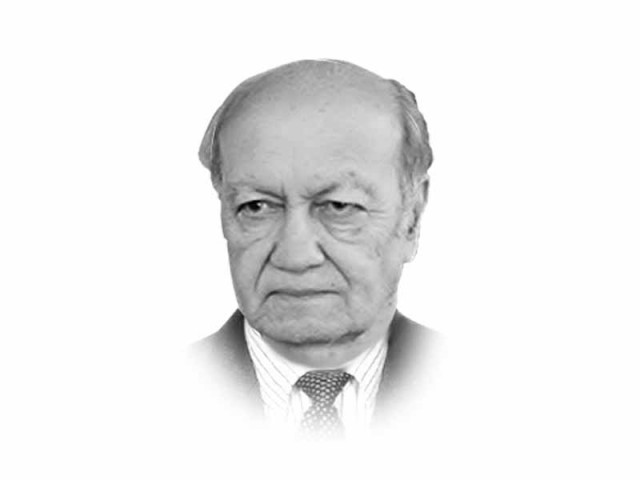Addressing multiple national challenges
We have mostly looked at national challenges through a narrow lens and tried to address them piecemeal

The writer is a retired lieutenant general of the Pakistan Army and a former federal secretary. He has also served as chairman of the Pakistan Ordnance Factories Board
The serious threat Pakistan faced from India since its inception, subsequent events that followed Soviet occupation of Afghanistan in the 1980s and later the catastrophic incident of 9/11 and to date, the focus has essentially been on security. This led us to join military pacts and be part of major global alignments for a significant part of our brief history. It had its monetary benefits in the form of loans and aid and we were recipients of modern military hardware. This placed Pakistan in a better position to balance India’s military prowess. But as nothing comes free it had a price, a price that we continue to pay right up to date. We were part and at times at the very centre of major power rivalry that came with a heavy cost.
This is not to say that during these years the military and civilian governments did not focus on human and infrastructural development but mostly through loans and foreign assistance and at a slow pace. And each of these agreements with foreign countries had strict conditions the consequences of which we continue to suffer.
The damaging aspect of this lopsided national approach has been that successive governments and the people have lost their sense of pride and dignity about their country. A classic demonstration of this is the cavalier manner in which the present government is portraying the recent loans and deferred oil payments from Saudi Arabia, the UAE and China. Indeed, this is an invaluable assistance from allies at a time when the country is facing a critical financial crisis for which we are most grateful. It also cannot be overlooked that the COAS played a major role in facilitating this assistance. The reliance of these countries on our military for ensuring the integrity of their projects in Pakistan, or in case of Saudi Arabia the safety and protection of holy places is a manifestation of this unique relationship.
At the same time, it is a moment for serious reflection when a country of 220 million people, the fifth largest in terms of population, a nuclear power and fielding one of the biggest professional armies is not financially self-reliant. One is tempted to ask how is that we compare ourselves in every major aspect of national power with our adversary but not so when it comes to having a self-sustaining economy or while measuring national pride. Financial dependence results in subservience and compromise on sovereignty and self-respect. It is not that the country is incapable of being self-reliant and economically viable. What is required is to have the national resolve to widen the taxation base, focus on improving the industrial and technological areas while simultaneously addressing educational and infrastructural development. Experience of other rapidly developing economies like South Korea and China indicates that progress requires an educated polity and a reasonable health cover for its citizens so that they are in a position to earnestly endeavour to achieve national goals.
This would also require close coordination with provinces, as some of these subjects lie in their constitutional domain. And this demands a more cooperative relationship with the opposition that has been grossly lacking. The opposition is up in arms against the government and parliament practically paralysed with hardly any legislation or serious business being undertaken. There is an endless mantra on corruption by ministers and government spokespersons. It has value provided, it does not lean towards witch-hunting opposition leaders and the quest for its eradication remains universal.
The internal reformation should be accompanied by a serious reappraisal of foreign policy and its compatibility with national goals. This would require a serious effort to improve relations with Afghanistan and seeking a working relationship with India. This can only occur if there is a major reassessment of our policies in terms of how we deal with the Afghan Taliban and the role we play in bringing them to the negotiating table. With India, the situation is more complex but essentially both countries will have to come to an understanding to desist from undermining each other. And try to resolve their political differences through dialogue and mutual give and take. The irony is that India and Pakistan have failed in their Kashmir policies. Modi government’s policy of brutally suppressing the Kashmiris has reignited their resolve to stand steadfast in their pursuit for self-determination. In the same context, Pakistan’s sincere efforts to arouse the world’s conscience against Indian brutalities has not been successful. It is indeed reprehensible that the Western world that claims to be the champions of human rights looks the other way when it views the happenings in Kashmir. Consequently, it has given India a cover to hide its atrocities under the guise that Pakistan is promoting terrorism. Sadly, Afghanistan too has been able to sell its side of the story that Pakistan provides haven to its enemies.
For any country to make progress, it should have a functional society and an internal and external environment that is peaceful. No one expects that Pakistan would achieve these goals soon but at least our trajectory and resolve should be in the right direction. Unfortunately, one does not see that happening so far. I could add a few more prerequisites for progress, but those listed should suffice to illustrate that Pakistan is weak in most of the basic attributes that demand a nation to transform itself and be counted.
Published in The Express Tribune, January 16th, 2019.
Like Opinion & Editorial on Facebook, follow @ETOpEd on Twitter to receive all updates on all our daily pieces.















COMMENTS
Comments are moderated and generally will be posted if they are on-topic and not abusive.
For more information, please see our Comments FAQ